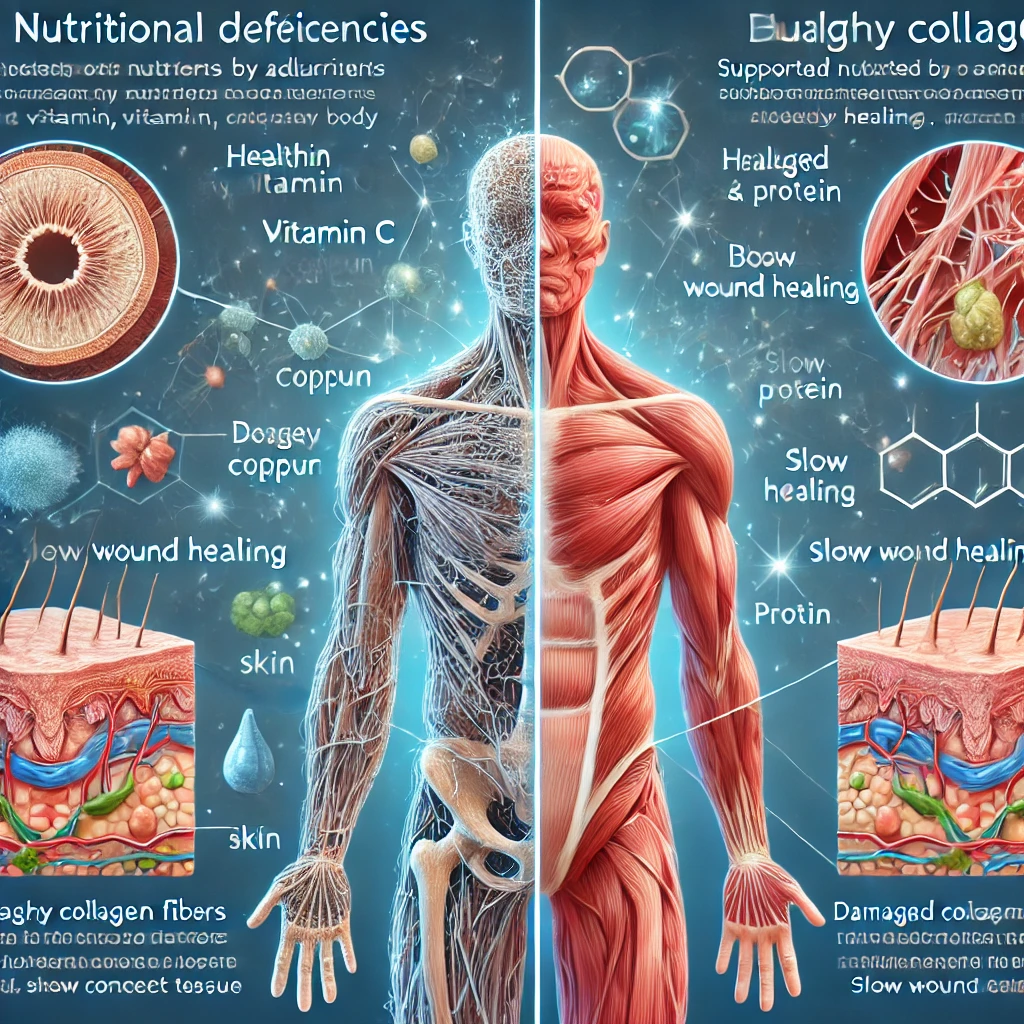How Nutritional Deficiencies Accelerate Collagen Loss

When most people think about collagen, they picture smooth, firm, youthful skin. But collagen isn’t just about beauty—it’s the most abundant protein in the body, providing structure for your skin, joints, tendons, bones, and even blood vessels.
As we age, collagen production naturally declines, leading to wrinkles, sagging skin, and reduced joint flexibility. But here’s something many people don’t realize: nutritional deficiencies can speed up collagen loss—even in younger adults.
At Sheen Vein (Aesthetics and Functional Medicine) in St. Louis, we take a whole-body approach to skin health. That means looking beyond creams and cosmetic treatments to address the root causes of collagen breakdown—starting with your nutrition.
Why Collagen Matters
Collagen acts like the scaffolding that holds your tissues together. In the skin, it provides elasticity and strength. In joints and ligaments, it acts as a shock absorber. In blood vessels, it supports flexibility and circulation.
When collagen is plentiful, skin looks plump, wounds heal quickly, and movement feels smooth. When it’s depleted, skin thins, wrinkles deepen, and joints become stiff or painful.
Nutrients Critical for Collagen Production
Your body can’t make collagen out of thin air—it needs raw materials and cofactors. Without them, collagen synthesis slows, and breakdown accelerates.
1. Vitamin C
Perhaps the most important nutrient for collagen production, vitamin C is a required cofactor for the enzymes that stabilize collagen fibers. Even mild deficiency can weaken connective tissue.
- Signs of deficiency: Easy bruising, slow wound healing, bleeding gums, and skin fragility.
- Sources: Citrus fruits, strawberries, kiwi, bell peppers, broccoli.
2. Protein & Amino Acids
Collagen is built from amino acids—especially glycine, proline, and hydroxyproline. Without enough dietary protein, your body can’t produce or repair collagen effectively.
- Signs of deficiency: Thinning hair, brittle nails, muscle loss, slow recovery from injuries.
- Sources: Lean meats, poultry, fish, eggs, beans, collagen peptide supplements.
3. Copper
Copper helps cross-link collagen fibers, giving them strength and durability. It also supports elastin, the protein that allows tissues to stretch and snap back.
- Signs of deficiency: Weak connective tissue, fragile blood vessels, joint problems.
- Sources: Shellfish, nuts, seeds, whole grains, dark chocolate.
4. Zinc
Zinc is essential for tissue repair, wound healing, and immune function. It also supports enzymes involved in collagen synthesis.
- Signs of deficiency: Poor wound healing, skin rashes, hair loss.
- Sources: Meat, oysters, pumpkin seeds, legumes.
5. Antioxidants
Free radicals—produced by UV light, pollution, and stress—damage collagen fibers. Antioxidants from foods like berries, leafy greens, and green tea help neutralize this damage and protect collagen integrity.
How Nutritional Deficiencies Speed Collagen Breakdown
If you’re low in one or more of these nutrients, your collagen matrix weakens in two main ways:
- Reduced Production – Without vitamin C, amino acids, and minerals, collagen strands are unstable and easily broken.
- Accelerated Damage – Without antioxidants, collagen is more vulnerable to oxidative stress from sun exposure, smoking, and environmental toxins.
Over time, these factors lead to visible signs of premature aging: fine lines, sagging, under-eye hollows, and loss of skin firmness.
Functional Medicine’s Role in Collagen Preservation
At Sheen Vein (Aesthetics and Functional Medicine), we believe the best skin care plan starts from the inside. That’s why we:
- Test for Deficiencies – Advanced lab testing can reveal low vitamin, mineral, and amino acid levels.
- Address Gut Health – Poor digestion or conditions like leaky gut can impair nutrient absorption.
- Create Targeted Supplement Plans – Collagen peptides, vitamin C, zinc, and antioxidants can be strategically dosed to restore production.
When internal health is supported, in-office treatments like microneedling with PRF or Fotona skin tightening have even better, longer-lasting results because your body can build and maintain new collagen.
Lifestyle Factors That Compound Collagen Loss
Nutritional deficiencies aren’t the only culprit—certain habits can make matters worse:
- Excess Sugar: Promotes glycation, a process that stiffens collagen fibers.
- Smoking: Reduces blood flow and damages collagen through free radical production.
- Chronic Stress: Increases cortisol, which breaks down connective tissue.
- Poor Sleep: Limits nighttime tissue repair and collagen synthesis.
By combining nutrient optimization with healthy lifestyle choices, you can slow collagen loss and maintain more youthful, resilient skin.
Bottom Line
Collagen loss is not just an inevitable part of aging—it’s something you can influence through nutrition and lifestyle. Deficiencies in vitamin C, protein, zinc, copper, and antioxidants can accelerate breakdown, leading to premature skin aging, joint stiffness, and poor wound healing.
By correcting these deficiencies, protecting against oxidative stress, and supporting your skin from the inside out, you can preserve your collagen for years to come.
Want to know where your collagen health stands?
Our St. Louis clinic offers nutritional testing, functional medicine consultations, and advanced skin treatments to help you look and feel your best at every age.
Learn more about our Functional Medicine services »
Explore our Skin Rejuvenation treatments »